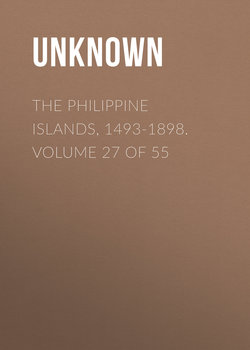Читать книгу The Philippine Islands, 1493-1898. Volume 27 of 55 - Unknown - Страница 13
На сайте Литреса книга снята с продажи.
Grau y Monfalcon’s Informatory Memorial of 1637
[VI. Proposition to abandon the islands, and its foundations.—Ex. his.]
ОглавлениеThe Filipinas Islands, which dominate the archipelago of Sant Lazaro, merit, for many claims, causes, and reasons, the esteem in which they have always been held. Contrary to all these, it was represented already, in the times of the sovereigns your Majesty’s grandfather and father, that it seemed advisable to abandon the islands, and leave them to whomever cared to occupy them. It was remarked in the Council of State, where the matter was ventilated, and where a consultation was held, the question being presented with the motives for this resolution, that those islands not only did not increase the royal revenues, but even decreased and diminished them, and were a continual cause of great and fruitless expense, as they are so many, so remote, and so difficult of conservation. The instigators of this proposition availed themselves, as says the author of the History of the Malucas,8 of the example of the kings of China—who being the sovereigns of the islands, and so near that they could reënforce them in a short time, as being so adjacent and near their great continent, abandoned them, in order not to be under obligation for the expenses and cares that were necessary to maintain them. They said that España’s method of governing them was very burdensome and prejudicial to the monarchy, and was without any hope of being improved, because of the great amount of silver that was sent to the islands from the Indias on that account, both for the ordinary expenses of war, and for the conservation of commerce—all of that silver passing to Assia, whence it never issued. They said that the states, so scattered and so weakened by so many wide expanses of water and remote climes, could scarcely be reduced to union; nor was human foresight sufficient to introduce union in that which nature itself, and the way in which the world was put together, separated by so distinct bounds. That was proved not only by reason but also by experience, which had discovered and proved how difficult and even impossible was the conservation of those islands, unless the cost were very greatly in excess of the profit—although, in this matter, one should first decide whether [questions of] honor and polity counted for anything.
8
See Vol. xvi of this series, pp. 225–227.
